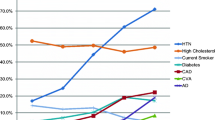Abstract
Objective
The aims of the present study were: (a) to obtain new normative data of the Italian version of the Mini-Mental Examination State (MMSE) (Measso et al. in Dev Neuropsychol 9:77–85, 1993) by administering the tool to a sample of normal Italian individuals more representative of the current Italian population; (b) to compare the sensitivity of this tool in detecting patients suffering from Alzheimer’s disease (AD according to NIA-AA), as compared to the those reported in previous normative Italian studies.
Methods
MMSE was administered to 314 normal subjects recruited among individuals (and/or their relatives) attending the Offices of General Practitioners (GP) or Memory Clinics in Campania (Italy) by convenience sampling. A group of 47 patients with AD were included into the study. The effect of demographic variables on the raw MMSE scores of normal subjects was checked by multiple linear regression assuming MMSE scores as dependent variable and age, gender and education as the independent one(s). Therefore, a simultaneous regression model was constructed to correct the raw scores according the sensitive variables. Correction grid and equivalent scores were devised to classify subject’s performance.
Results
The mean raw MMSE score was 27.78 (SD = 1.80) (range 22–30/30). There was no significant difference between scores achieved by men or women (p = 0.688). Multiple linear regression analysis showed a significant effect of age and years of school attendance on the MMSE raw score, whereas gender did not show any significant effect. The cutoff score, distinguishing between pathological and normal performances, was fixed at the fifth centile corresponding to 24.9/30, higher than the current score of 23.8/30. The new cutoff value was able to identify 44/47 patients with AD, in contrast to 38/47 subjects detected by currently used norms.
Conclusions
(1) A more updated and representative population sample; (2) a new cutoff threshold able to distinguish between normal and pathological performances; (3) a correction grid that reduces the risk of false-positive and false-negative values due to the influence of the main demographic factors; (4) greater sensitivity, compared to previous Italian normative studies in identifying people with dementia.
Similar content being viewed by others
References
Measso G, Cavarzeran F, Zappalà G et al (1993) The mini-mental state examination: normative study of an Italian random sample. Dev Neuropsychol 9:77–85
Grigoletto F, Zappalà G, Anderson DW et al (1999) Norms for the mini-mental state examination in a healthy population. Neurology 53:315–320
Magni E, Binetti G, Bianchetti A, Rozzoni R, Trabucchi M (1996) Mini-mental state examination: a normative study in Italian elderly population. Eur J Neurol 3:198–202
McKhann G, Knopman DS, Chertkow H et al (2011) The diagnosis of dementia due to Alzheimer’s disease: recommendations from the National Institute on Aging-Alzheimer’s Association workgroups on diagnostic guidelines for Alzheimer’s disease. Alzheimer’s Dement 7:263–269
Iavarone A, Carpinelli Mazzi M, Russo G et al (2018) The Italian version of the quick mild cognitive impairment (Qmci-I) screen: normative study on 307 healthy subjects. Aging Clin Exp Res. https://doi.org/10.1007/s40520-018-0981-2
Hughes CP, Berg L, Danziger WL et al (1982) A new clinical scale for the staging of dementia. Br J Psychiatry 140:566–572
Frisoni GB, Rozzini R, Bianchetti A et al (1993) Principal lifetime occupation and MMSE score in elderly persons. J Gerontol 48:S310–S314
Capitani E, Laiacona M (1988) Aging and psychometric diagnosis of intellectual impairment: some considerations on test scores and their use. Dev Neuropsychol 4:325–330
Santangelo G, Siciliano M, Pedone R et al (2015) Normative data for the montreal cognitive assessment in an Italian population sample. Neurol Sci 36:585–591
Iavarone A, Ronga B, Pellegrino L et al (2004) The frontal assessment battery (FAB): normative data from an Italian sample and performances of patients with Alzheimer’s disease and frontotemporal dementia. Funct Neurol 19:191–195
Spinnler H, Tognoni G (1987) Standardizzazione e taratura italiana di test neuropsicologici. Ital J Neurol Sci 6:8–120
Acknowledgements
Working group: Ferdinando Ivano Ambra (UOC Neurologia, Azienda Ospedaliera dei Colli Monaldi-Cotugno-CTO, Napoli, Italia), Michele Arcopinto (DAI Medicina Interna, AOU “Federico II”, Napoli, Italia), Patrizia Cuccaro (UOS Ricerca e Sviluppo, AOU “Federico II”, Napoli, Italia), Simona De Chiara (G.P. Office, Napoli, Italia), Carmine Del Giudice (UOS Ricerca e Sviluppo, AOU “Federico II”, Napoli, Italia), Gabriella De Joanna (UOC Neurofisiopatologia, Azienda Ospedaliera di Rilievo Nazionale Antonio Cardarelli, Napoli, Italia), Nicola Ferrara (Dipartimento di Scienze Mediche Traslazionali, Università di Napoli “Federico II”, Napoli, Italia), Iolanda Grimaldi (UOS Ricerca e Sviluppo, AOU “Federico II”, Napoli, Italia), Guido Iaccarino (Dipartimento di Medicina, Chirurgia ed Odontoiatria, Università di Salerno, Italia), Ilaria Liguori (UOS Ricerca e Sviluppo, AOU “Federico II”, Napoli, Italia), Valentino Manzo (UOC Neurologia, Azienda Ospedaliera di Rilievo Nazionale Antonio Cardarelli, Napoli, Italia), Pietro Mazzeo (Dipartimento di Medicina, Chirurgia ed Odontoiatria, Università di Salerno, Italia), Giovanni Tramontano (UOS Ricerca e Sviluppo, AOU “Federico II”, Napoli, Italia), Francesca Saveria Tripodi (Centro Geriatrico Frullone, ASL Napoli 1 Centro, Napoli, Italia).
Funding
None of the authors received any funding for this work.
Author information
Authors and Affiliations
Consortia
Corresponding author
Ethics declarations
Conflict of interest
On behalf of all the authors, the corresponding author states that there is no conflict of interest.
Statement of human and animal rights
This study was carried out according to the Declaration of Helsinki and approved by the local ethics committee.
Informed consent
All subjects gave informed consent to the study.
Additional information
Publisher's Note
Springer Nature remains neutral with regard to jurisdictional claims in published maps and institutional affiliations.
Working group members are listed in the Acknowledgements section.
Rights and permissions
About this article
Cite this article
Carpinelli Mazzi, M., Iavarone, A., Russo, G. et al. Mini-Mental State Examination: new normative values on subjects in Southern Italy. Aging Clin Exp Res 32, 699–702 (2020). https://doi.org/10.1007/s40520-019-01250-2
Received:
Accepted:
Published:
Issue Date:
DOI: https://doi.org/10.1007/s40520-019-01250-2




